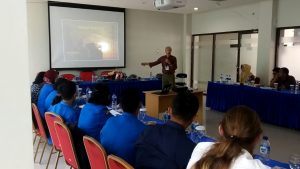 International Office has successfully held a program called Field Course in Conservation Biology and Global Health cooperating with university of Washington. Two instructors from University of Washington, Prof. Randall C. Kyes, Ph.D and Dr. Pensri Kyes, Ph.D, and the other one from Tadulako University; Dr. Ir. Yulius Duma., MP, provided valuable lecturing, training and workshop, during this course. This course was attended by the students from Faculty of Animal Husbandry and Fishery, Faculty of Forestry, Faculty of Agriculture, Faculty of Mathematics and Natural Sciences, and Faculty of Teacher Training and Education, and some related lecturers. This program was officially opened by Prof. Dr. H. Amar Akbar Ali, ST.,MT as the vice rector of development and coorporation, Tadulako University, and also attended by some deans from those related faculties.
International Office has successfully held a program called Field Course in Conservation Biology and Global Health cooperating with university of Washington. Two instructors from University of Washington, Prof. Randall C. Kyes, Ph.D and Dr. Pensri Kyes, Ph.D, and the other one from Tadulako University; Dr. Ir. Yulius Duma., MP, provided valuable lecturing, training and workshop, during this course. This course was attended by the students from Faculty of Animal Husbandry and Fishery, Faculty of Forestry, Faculty of Agriculture, Faculty of Mathematics and Natural Sciences, and Faculty of Teacher Training and Education, and some related lecturers. This program was officially opened by Prof. Dr. H. Amar Akbar Ali, ST.,MT as the vice rector of development and coorporation, Tadulako University, and also attended by some deans from those related faculties.
This program was held for three days, from 24 to 26 of July 2019. On the first day, the two instructors, Prof. R. Kyes – preferably called Mas Randy – and Dr. P. Kyes, gave a course explaining about some problems faced between primates and humans. Additionally, they not only explained an introduction of some threats to biological diversity and the risk to human health, but also informed some methods, field and equipment exercises to the participants which could facilitate them to do the field course including the training in Kebun Kopi for the next day.
On the second day, all the participants, instructors and committee departed to Binangga National Preserve, at Kebun Kopi, to engage in the observation of Macacques’ behaviours by using some methods and field equipment, taught at the previous meeting. In this field course, the participants were introduced to some macaques species and asked to analyze their habitual actions, such as how the macaques did the foraging, grooming, and resting. Following the field course in Kebun Kopi, the session continued in the class with a talk by Dr. Ir. Yulius Duma MP, who presented about the introduction of primates for enhancing the participants’ knowledge and understanding of this topic.
In the last meeting on 26th July, Prof. R. Kyes presented about his survey study about primates population in Java Island and the success of outreach education program for elementary school student nearby the area of Tangkoko national park, North Sulawesi, in making the population of Macaques stabilized. Moreover, Dr. P. Kyes also gave interesting information about lotic ecosystem. At the end of these presentations, the participants were enthusiastic to ask some questions and gave their comments related to the material given by those three instructors.
This program has brought self-awareness for people to save the environment for the coexistence between human and primates, and to build a conservation management strategy of macaques. As a result, the population of macaques will not drop significantly as what happened in the few past years.
